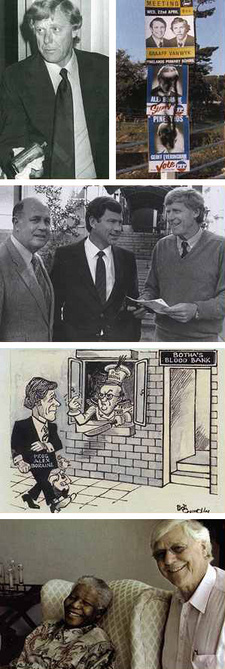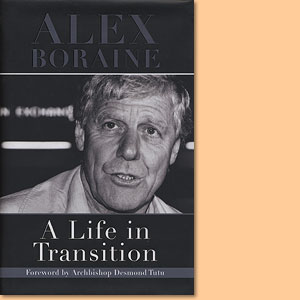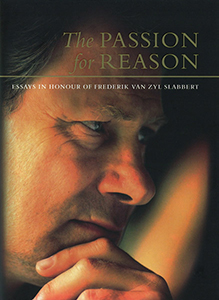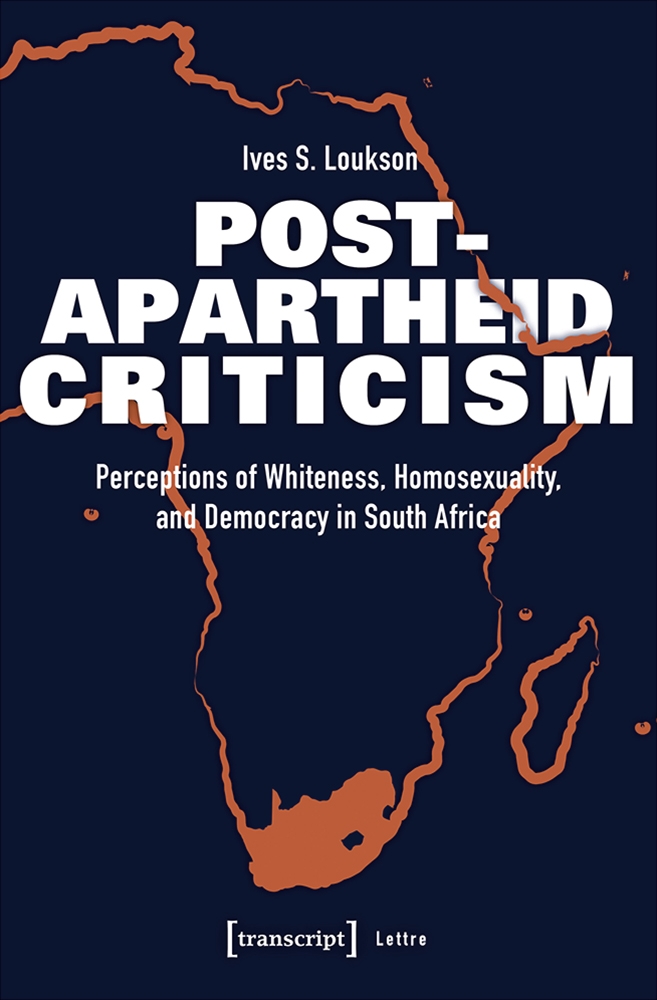A Life in Transition. Alex Boraine, by Alex Boraine
Foreword by Desmond Tutu: When President Nelson Mandela appointed us to the Truth and Reconciliation Commission in 1995, Alex Boraine and I were expected to hit the ground running.
The commission was deliberately designed to have a short shelf life. We had to start literally from scratch - no staff, no premises, absolutely no infrastructure. I really would not wish our plight on even my worst enemy. It just seemed all had been designed as a recipe for disaster. What a wonderful gift to have had Alex Boraine as the deputy chair (quite a few had rightly thought he should have been the chair).
He has formidable managerial and administrative skills in addition to his other admirable attributes. And so, almost as if he had been a consummate magician pulling rabbits nonchalantly out of a hat, we soon had a head office in Cape Town and four regional offices in Cape Town, Johannesburg, East London and Durban, almost all fully staffed and equipped.It was indeed almost magically that after our inaugural meeting - symbolically on the Day of Reconciliation, 16 December 1995 - we were able to hold our first public hearing in East London in April 1996. None of this would have happened had we not been blessed with an Alex Boraine. I want again to pay very warm tribute to him, especially for that crucial intervention then.
It would have been an excruciating hell had it been that his loyalty to the chair had been less than wholehearted and genuine. The work of the commission was traumatic and revealed just how we had all been damaged by apartheid. This was revealed starkly when a black commissioner was wrongfully implicated in a matter before the Amnesty Committee - the com- mission was split down the middle along racial lines, most blacks believing him to be innocent and most whites conversely thinking there could be no smoke without fire.
So our warm friendship and Alex's undivided loyalty were not inevitable. Indeed, they were extraordinary phenomena. What a huge relief that I did not ever have to watch my back. It would have been so debilitating had it been otherwise. We were on the same wavelength on almost all issues. We had many tricky moments, but it was so invigorating to know that we shared the same perspectives and held dear the same values. We can never take that sort of thing for granted.
Alex has a formidable theological and philosophical intellect. After all, he was the youngest cleric to be elected president of the Methodist Conference. Clearly he was an impressive personality, and soon made his mark in the political arena as an MP for the Progressive Federal Party, where he and his few fellow party members proved a constant thorn in the flesh of the racist National Party. His impeccable integrity forced him to resign from parliament when he felt that his continued presence lent an undeserved credibility to what was no more than a cruel charade.
Together with Van Zyl Slabbert, he founded IDASA, seeking to provide rational alternatives to what was so fundamentally irrational, cruel and inhumane. His own experience of deprivation (he started working at the age of fourteen) inspired his passion for justice and equity, as did his interaction with blacks when he traversed the length and breadth of South Africa as director of the Methodist Church's Department of Christian Education.
He was at the forefront of those who were already considering how South Africans would deal with the aftermath of conflict in the post-apartheid period, especially in the non-governmental organisation Justice in Transition, which he set up. With others they debated the various options. What a wonderful blessing that he should have been a dear friend of Dullah Omar, who, as minister of justice in the first post-apartheid government of Nelson Mandela, was to pilot through parliament the legislation setting up the TRC. Alex was prominent in drafting that legislation.
I have nothing but the highest praise for the outstanding work Alex did in the TRC. His contribution was invaluable and irreplaceable. He went on to found in New York the highly acclaimed International Center for Transitional Justice, of which he was president for the first four years. He has helped to make it the best of its kind, held in the highest possible esteem globally. He did this while a professor at the New York University Law School. I am greatly honoured to have been asked to provide this foreword. You are about to be regaled with the story of one of South Africa's greatest sons, who has been so ably aided and abetted by his charming wife, Jenny. Enjoy it and be moved and inspired.
Preface by Alex Boraine:
WHEN I STARTED WRITING THIS BOOK, IT WAS GOING TO BE a substantial study of transitional justice, drawing on many anecdotes from a number of the countries I have visited as president of the International Center for Transitional Justice. While in Bellagio on a fellow-ship from the Rockefeller Foundation in 2005, I spent a great deal of time researching the theory and practice of transitional justice and developed quite a large body of writing. But when I discussed this with a number of friends and family, and finally with my editors, there was a strong view that I should focus on the life that I have lived and the various professions in which I have served. Thus, the book is very much a story of my life, from early beginnings to the present. I have attempted to reflect on my life by sharing my understanding of transitional justice and some of my experiences in this field.
Inevitably, I have revisited South Africa's Truth and Reconciliation Commission, covered in depth in my previous book, A Country Unmasked, and some of the material from that book is repeated here. I have many, many people to thank for helping me to write this book. Obviously, I am grateful to my parents and immediate family, who gave me a good and solid base on which to build, even though our economic and social situation was so restricted. I also want to thank so many family and friends who have shared my life over many years, challenging, advising and generally supporting me in every possible way.
It is very difficult to write about oneself, and much easier to focus on issues. Francis Wilson, an old friend, helped me get started by asking searching questions about my early childhood. Every writer owes a debt of gratitude to his or her editors. I certainly could not have written this book without careful and thorough editing by Robert Plummer and Marlene Burger. Robert was the editor of my previous book, A Country Unmasked, and I was keen to renew that relationship. I would also like to thank Marlene Fryer and everyone at Zebra Press.
In particular, my thanks to Paddy Clark, who transcribed and typed every word of the manuscript and was also enormously helpful as a researcher. I remain very much in her debt. When the going got quite tough and writing was difficult, she gave me a great deal of encouragement. I am most grateful to Archbishop Emeritus Desmond Tutu for his over-generous foreword, and also for the example set by his life, and his abiding friendship. My family has always been close and supportive, and while I wrote this book, they were there for me. I claimed a great deal of their time talking about some of the ideas and stories that I wanted to include, and they always listened patiently and with encouragement. Special thanks to Andrew, Jeremy, Kathy and Nick. This book is dedicated to my wife, Jenny, who features throughout the book, because she is the centre of my life.
There are many friends from the church, business, politics and civil society in South Africa and further afield, especially in New York, who have been most generous in their support and time and encouragement. I want to thank in particular the staff of the International Center for Transitional Justice. In many ways, we started as a small family and have grown beyond my wildest dreams. I am thankful to be part of this ongoing, dynamic group, so many of whom have become not only colleagues, but also friends.
This is an extract from the book: A Life in Transition. Alex Boraine, by Alex Boraine.
Book title: A Life in Transition. Alex Boraine
Author: Alex Boraine
Publisher: Zebra Press
Cape Town, South Africa 2008
ISBN: 9781770220126
Hardcover, dustjacket, 15x23 cm, 472 pages, several photos
Boraine, Alex im Namibiana-Buchangebot
A Life in Transition. Alex Boraine
Alex Boraine's fascinating life of fighting injustice in South Africa.
The Passion for Reason. Essays in Honour of Frederik Van Zyl Slabbert
Various well known authers have contributed essays in honour of Frederik Van Zyl Slabbert in The Passion for Reason.
Weitere Buchempfehlungen
Post-Apartheid Criticism. Perceptions of Whiteness, Homosexuality, and Democracy in South Africa
Post-Apartheid Criticism. Perceptions of Whiteness, Homosexuality, and Democracy in South Africa seeks to examine the contribution of post-apartheid narrative.




